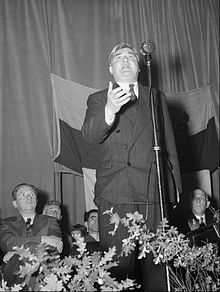Aneurin Bevan
|
The Right Honourable Aneurin Bevan |
|
|---|---|
 |
|
| Deputy Leader of the Labour Party | |
|
In office 4 May 1959 – 6 July 1960 |
|
| Leader | Hugh Gaitskell |
| Preceded by | Jim Griffiths |
| Succeeded by | George Brown |
| Shadow Foreign Secretary | |
|
In office 22 July 1956 – 4 May 1959 |
|
| Leader | Hugh Gaitskell |
| Preceded by | Alf Robens |
| Succeeded by | Denis Healey |
| Minister of Labour and National Service | |
|
In office 17 January 1951 – 23 April 1951 |
|
| Monarch | George VI |
| Prime Minister | Clement Attlee |
| Preceded by | George Isaacs |
| Succeeded by | Alf Robens |
| Minister of Health | |
|
In office 3 August 1945 – 17 January 1951 |
|
| Monarch | George VI |
| Prime Minister | Clement Attlee |
| Preceded by | Henry Willink |
| Succeeded by | Hilary Marquand |
|
Member of Parliament for Ebbw Vale |
|
|
In office 31 May 1929 – 6 July 1960 |
|
| Preceded by | Evan Davies |
| Succeeded by | Michael Foot |
| Personal details | |
| Born |
15 November 1897 Tredegar, Wales |
| Died | 6 July 1960 (aged 62) Chesham, England |
| Political party | Labour |
| Spouse(s) | Jennie Lee (m. 1934) |
| Alma mater | Central Labour College |
Aneurin Bevan (pronunciation: /əˈnaɪrᵻn ˈbɛvən/; Welsh: [aˈnəɨ.rɪn]; 15 November 1897 – 6 July 1960), often known as Nye Bevan, was a Welsh Labour Party politician who was the Minister for Health in the post-war Attlee government from 1945 to 1951. The son of a coal miner, Bevan was a lifelong champion of social justice, rights of working people and democratic socialism. He was a long-time Member of Parliament (MP), representing Ebbw Vale in South Wales for 31 years. He was one of the chief spokesmen for the Labour Party's left wing, and of left-wing British thought generally. His most famous accomplishment came when, as Minister of Health, he spearheaded the establishment of the National Health Service, which was to provide medical care free at point-of-need to all Britons. He resigned when the Attlee government decided to transfer funds from the National Insurance Fund to pay for rearmament. The left-wing group within the party, known as "Bevanite", was named after him, but he did not control it.
Bevan remains one of Wales's most revered politicians. In 2004, over 40 years after his death, he was voted first in a list of 100 Welsh Heroes, having been credited for his contribution to the welfare state.
...
Wikipedia
